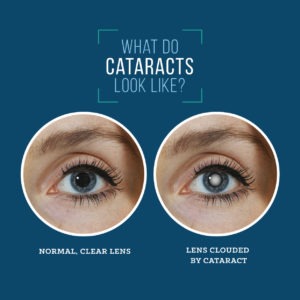How Does Uncontrolled diabetes Impact Eye Health?
Uncontrolled diabetes can wreak havoc on health in many ways, including eye health.
All types of diabetes increase the risk of developing eye diseases including diabetic retinopathy, diabetic macular edema, glaucoma, and cataracts. When these diseases all go under the umbrella term “diabetic eye disease,” it means diabetes is one of the world’s leading causes of blindness.
The Types of Diabetes
All three types of diabetes impact eye health even though they don’t work the same way. Type 1 is typically diagnosed early in life. When the pancreas cannot produce insulin, that’s type 1 diabetes. Up to 95% of diabetes cases are type 2, typically diagnosed decades into adulthood. In type 2 diabetes, the body is unable to efficiently use insulin to regulate blood sugar. Some pregnant women are affected by gestational diabetes, which behaves like type 2 diabetes but is temporary.
Increased Risk of Cataracts With Diabetes
Diabetics are five times more likely to develop cataracts. High blood sugar can make the lens of the eye swell and accumulate opaque proteins until it becomes cloudy. Vision loss due to cataracts is reversible with modern cataract-removal surgery, however, so the effects don’t have to be permanent.
Diabetic Retinopathy and Macular Edema
When blood sugar is high, so is the blood’s acidity, and this can cause actual damage to blood vessels. In the eyes, this creates a major problem in the delicate capillaries that nourish the retinas. When those capillaries weaken enough to begin leaking blood into the eye (creating the symptom of dark blotches or floaters across the field of vision), this is diabetic retinopathy. The body tries to fix this by growing new blood vessels, but the new vessels are unstable and more likely to leak.
10% of diabetic retinopathy cases will eventually develop into diabetic macular edema (DME), which is the buildup of fluid in the macula (the area of the retina that gives us our central vision). This creates distortions and washes out the colors and may require surgical treatment to restore normal vision.
Glaucoma Is More Likely With Diabetes
It may surprise you to learn that the fluid in our eyes doesn’t just stay there for our entire lives. It exists in a cycle to constantly replace and replenish it — an essential part of eye health. Glaucoma is the result of the cycle being interrupted. Pressure builds against the optic nerve and causes permanent damage, including blindness. Diabetics are more susceptible to glaucoma, and the symptoms aren’t always obvious. The best way to catch it early is with regular eye exams!
Eye Exams Protect Your Eyesight!
Yearly eye exams are key to early diagnosis and treatment for sight-threatening conditions, and they’re particularly important for anyone at high risk, like people with diabetes. Some sight-threatening conditions are irreversible but they can at least be slowed and controlled when we catch them early. Managing diabetes is also essential. If the blood sugar remains as close to normal as possible, diabetes can’t put eye health in as much danger, and the risk remains at levels similar to people without diabetes.




